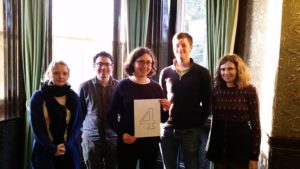We had our fourth Voice and Influence session on the 28th February on mentoring, where we learnt how to develop successful mentoring relationships beneficial to both involved. Mentoring is important in academia, therefore this was very relevant to us.
One of the first things we learned is that a mentoring relationship should be reciprocal. Instead of the mentor giving and the mentee receiving, both should gain from the relationship. This surprised many of us, as it is counter intuitive, given that the traditional view of mentoring is someone in a higher position giving help and advice. We discussed how this is not always the case, mentoring can simply be peers supporting each other and giving each other feedback and advice. We discussed whether our mentoring relationships are reciprocal. For example, a PhD supervisor gives guidance and advice to their supervisee, whilst a supervisee follows leads the supervisor may not have time to pursue themselves.
We tend to form mentoring relationships with those similar to ourselves. However, the most effective mentoring relationships involve both similarities and differences, because we can learn from different perspectives. Therefore, we should try to also develop mentoring relationships with those with different attitudes or views to us. In academia an obvious similarity would be research areas. However sometimes it is also interesting to engage with those from different research areas that overlap with your own, as sometimes they see interesting different perspectives or directions.
Roadblocks to successful mentoring relationships were considered. Protective hesitation is when someone chooses not to give feedback because they are worried about offending the other person. Protective defensiveness is resistance to feedback out of the fear of being offended. However, this feedback is often useful in the long-term progression of a person’s career and is an opportunity to learn. Therefore, if this feedback is not taken on board, it holds people back. We discussed how to give feedback, such as feedback to our supervisor on the way we would like to be supervised. We discussed how supervisors cannot read minds and so in order for them to know the most effective methods for us, we must tell them ourselves. We also discussed situations in which someone may not be receptive to feedback and how to deal with this.
We also learned how access can be a roadblock. Women and those of ethnic minorities sometimes have less access to influential mentoring relationships. Organisations can prevent this with formal mentoring schemes, however even these sometimes have the same problems. Organisations must actively ensure that this is not the case.
We learned steps for beginning mentoring relationships. Step 1 is Self Assessment, this involves examining your strengths and challenges, and evaluating what you have to offer to others, and what you want to gain from them. The next step is Identifying your Purpose, so thinking about your goals and how mentoring might help towards these goals. Step 3 is Investigation, talk to lots of people and identify who may you would like to develop a mentoring relationship with.
The next session will be on Tuesday, 14th March at 4pm on Negotiation, all are welcome to join.
Lydia Garms, PhD student
